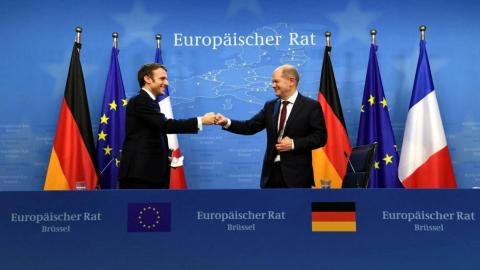
Brussels and UK officials will clash over the increasingly fraught question of whether the European Union can open an office in Belfast.
At the inaugural meeting on Thursday of a special committee of officials charged with enforcing a de facto Irish Sea border, the European commission is expected to press the case to open “a technical office” in Belfast, three days after the government rejected an EU “mini-embassy” in the Northern Irish capital.
The EU is refusing to drop the issue, amid fears Boris Johnson’s government could renege on the Brexit withdrawal agreement that requires Northern Ireland to follow EU single market and customs rules.
The British government, which says it is fully committed to the agreement, argues an EU office is not necessary and would sow division in Northern Irish politics.
A narrow majority of Northern Irish MPs, it has emerged, back the EU plan for a Belfast office. Ten of 18 MPs elected to Westminster reject the government’s argument, including Sinn Fein, who do not take their seats. The Democratic Unionist party, who make up the remaining eight, support the government, whose position was outlined by the paymaster general, Penny Mordaunt, on Monday.
In a letter to senior EU officials including the chief negotiator, Michel Barnier, Mordaunt said a special EU office would be “divisive in political and community terms” and was not required by the Irish protocol agreed last October.
Stephen Farry, the Alliance MP for North Down, accused the government of being petty and counterproductive. “This gamesmanship from the UK government is reflective of their wider approach of not taking preparations for the implementation of the protocol seriously,” he said.
Other MPs supporting the Belfast office see the EU presence as important to guarantee the rights of Northern Irish citizens, who have the right to hold both British and Irish citizenship under the Good Friday agreement. Anyone with Irish citizenship is automatically an EU citizen.
This argument does not chime with how Brussels views the office, which it conceives as narrowly focused on upholding single market rules, staffed by vets and customs experts. The office would not have an ambassador nor engage in diplomatic niceties such as lunches and cocktail parties.
The Irish protocol, agreed after months of bitter wrangling that helped end Theresa May’s government, leaves Northern Ireland de facto in the EU single market, following about 280 EU laws covering animal health, food safety and VAT, as well as the EU customs code.
The protocol specifies UK officials are responsible for implementing EU law, but EU officials have the right to be present during any activities related to putting it into practice. It does not specify the right to an EU office.
Mairead McGuinness, an Irish vice-president of the European parliament, said Northern Ireland would be “particularly affected by EU decisions” and an office could enable better understanding on both sides. “Belfast is perhaps more neutral than having such an office, tasked with overseeing the protocol’s implementation in Northern Ireland, in Dublin or London.”
The government says it is ready to support ad hoc visits, but the EU argues it would be impractical for officials based overseas to be routinely flying in.
The argument will be revisited on Thursday when officials on the Irish “specialised committee” meet for the first time, one of six technical groups on implementing the Brexit withdrawal agreement, who report to the Cabinet Office minister, Michael Gove, and the European commission vice-president Maroš Šefčovič.
Gove and Šefčovič co-chair the “joint committee”, the political management in charge of implementing the withdrawal agreement.
The Guardian has learned that the Irish specialised committee will be co-chaired by Brendan Threlfall, a former deputy director for Ireland and Northern Ireland at the defunct Brexit department.
Threlfall, who is said to be close to Gove, stepped into the Brexit role in 2018 after the lead official tasked with finding a solution to the Irish border quit for a new job working for Prince William.
The EU co-chair will be Philippe Bertrand, who was Barnier’s lead negotiator on the Brexit taskforce for the divorce bill, agriculture, fisheries and maritime policy. He will alternate with Thomas Lieflaender, the deputy head of the European Commission’s Brexit team.
EU concerns about the British commitment to implementing the protocol escalated after Gove told the Brexit select committee on Monday that the joint committee was an opportunity to “develop” the protocol. The EU has always said the joint committee can only implement the withdrawal agreement.












